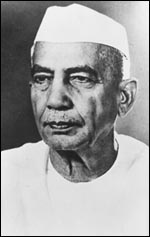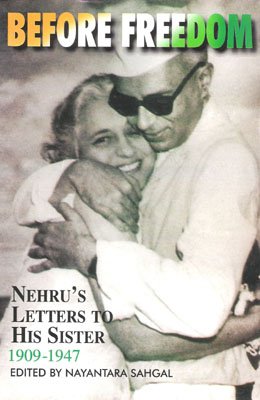
Feroze Gandhi was an Indian freedom fighter, politician and journalist.

Chaudhary Charan Singh served as the 5th prime minister of India between 28 July 1979 and 14 January 1980. Historians and people alike frequently refer to him as the 'champion of India's peasants'.

Priyanka Gandhi Vadra is an Indian politician and the general secretary of the All India Congress Committee in charge of Uttar Pradesh. She is the daughter of former Prime Minister of India Rajiv Gandhi and Sonia Gandhi, sister of Rahul Gandhi, and granddaughter of Feroze and Indira Gandhi, making her a member of the politically prominent Nehru-Gandhi family. She is also a trustee of the Rajiv Gandhi Foundation.

Sanjay Gandhi was an Indian politician and the younger son of Indira Gandhi and Feroze Gandhi. He was a member of parliament, Lok Sabha and the Nehru–Gandhi family.

The Emergency in India was a 21-month period from 1975 to 1977 when Prime Minister Indira Gandhi had a state of emergency declared across the country.

Kamala Nehru was an Indian independence activist and the wife of Jawaharlal Nehru, the first Prime Minister of India. Her daughter Indira Gandhi was the first female Prime Minister of India.
Tihar Prisons, also called Tihar Jail and Tihar Ashram, is a prison complex in India and one of the largest complex of prisons in South Asia. It has 9 functional prisons spread over more than 400 acres. Run by Department of Delhi Prisons, Government of Delhi, the prison contains nine central prisons, and is one of the three prison complexes in Delhi. The other two prison complexes are at Rohini and Mandoli with one and six central prisons respectively. Tihar prison complex is located in Janakpuri, approximately 3 km from Tihar village in West Delhi.

Ballia district is one of the districts of Uttar Pradesh, India. Ballia district is a part of Azamgarh division situated in the east of Uttar Pradesh. The main economic activity is agriculture. City is the district headquarters and commercial market of this district. It is the birthplace of former prime minister of India Chandra Sekhar Singh There are six tehsils in this district: Ballia, Bansdih, Rasra, Bairia, Sikandarpur and Belthara. Rasra is the second major commercial area of the district, having a government sugar mill and a cotton weaving industry. Though Ballia's core occupation is agriculture there are some additional small industries. Maniar is known for its bindi industry and is a major supplier.
Mahavir Tyagi was a prominent Indian independence fighter and parliamentarian from Dehra Dun, Uttar Pradesh India.

Yogendra Shukla was an Indian nationalist and freedom fighter from Bihar. He served in the Cellular Jail, and he was among the founders of Hindustan Socialist Republican Association (HSRA). Along with Basawon Singh (Sinha) he was among the founder members of the Congress Socialist Party from Bihar.

Naini is a satellite neighborhood and a twin city of Prayagraj in Prayagraj district, Uttar Pradesh, India. By the 1950s Naini was established as the chief industrial area of the city.

Sampurnanand was an Indian teacher and politician who served as the second Chief Minister of Uttar Pradesh from 1954 until 1960, and later as Governor of Rajasthan. Serving for five years and 344 days, he had the longest single tenure of any Uttar Pradesh Chief Minister until surpassed by Yogi Adityanath in 2023.
Dwarka Prasad Mishra was an Indian politician, writer and journalist. He was a member of the Indian National Congress and served as the Chief Minister of Madhya Pradesh for two terms during the 1960s.

The Nehru–Gandhi family is an Indian political family that has occupied a prominent place in the politics of India. The involvement of the family has traditionally revolved around the Indian National Congress, as various members have traditionally led the party. Three members of the family—Jawaharlal Nehru, Indira Gandhi and Rajiv Gandhi–have served as the prime minister of India, while several others have been members of parliament (MP).

Yerwada Central Jail is a noted high-security prison in Yerwada, Pune in Maharashtra. This is the largest prison in the state of Maharashtra, and also one of the largest prisons in South Asia, housing over 5,000 prisoners (2017) spread over various barracks and security zones, besides an open jail just outside its premises. Many well known nationalist fighters individuals including Mahatma Gandhi and Jawaharlal Nehru have been jailed here.

Kandrawan is a village in Unchahar block of Raebareli district, Uttar Pradesh, India. It is located on the road from Salon to Khaga, near the banks of the Ganges. Nearby there is a ferry crossing the Ganges over to Naubasta in Fatehpur district. As of 2011, Kandrawan has a population of 10,283 people, in 1,901 households. It is 3 km from Unchahar.
Bareilly Central Jail was built in 1848 at Bareilly in Uttar Pradesh, India, at a time when the authorities of the British East India Company were introducing a policy of constructing central prisons to house those convicted for long terms. The prisons were located in proximity to military bases so that soldiers could be called upon to quell any violence within them. This policy arose from a two-year enquiry that had begun in 1836 and included Macaulay among its members. As another strand of the policy, these new prisons were governed by police inspectors rather than, as previously, being under the control of district collectors. It was deemed that the collectors' many and varied other responsibilities caused them to have little time to oversee matters relating to the prison system but in due course it was also found that the police officers were similarly affected and thus dedicated prison superintendents were introduced. The change in responsibility caused members of the Indian Medical Service to take over from those of the Indian Civil Service and reflected the enquiry's concern regarding prison conditions, which it had considered to be chaotic, arbitrary, unsanitary and disease-ridden and the cause of high death rates. Despite these progressive conclusions, which also created a two-tier designation of "simple imprisonment" and "rigorous imprisonment", the principal purpose of the central prisons remained that of punishment rather than rehabilitation, with prisoners kept occupied in the performance of dull, repetitive tasks and with no provision for education or reward for good behaviour.

Yashpal Kapoor / Kapur (1929–1993) was a leader of Indian National Congress and a close aid of Indira Gandhi. Kapoor was member of the Rajya Sabha from Uttar Pradesh from 1972 to 1978. Indira Gandhi's election was declared null and void. She was banned from contesting in any election for an additional six years availing the services of a government officer, Yashpal Kapoor, during the elections before he had resigned from his position.

Before Freedom: Nehru's Letters to His Sister 1909–1947 is a collection of letters written by Jawaharlal Nehru between 1909 and 1947, to his sister Vijaya Lakshmi Pandit, affectionately referred to as Nan. The collection was edited and compiled by his niece, Nayantara Sahgal, and was first published in 2000 by HarperCollins. A later edition with an additional letter by Nehru to his sister following the death of her husband Ranjit Sitaram Pandit, was published in 2004 by Roli Books.

Ranjit Sitaram Pandit was an Indian barrister, politician, author and scholar from Rajkot in the Kathiawar region of British India. He is known for his role in the Indian non-cooperation movement, and for translating the Sanskrit texts Mudrarakshasa, Ṛtusaṃhāra and Kalhana's Rajatarangini into English.
















